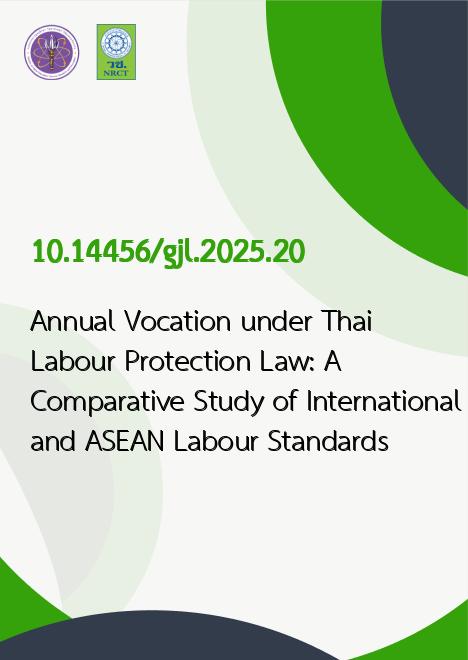
|
Annual Vocation under Thai Labour Protection Law: A Comparative Study of International and ASEAN Labour Standards |
|---|---|
| รหัสดีโอไอ | |
| Creator | Surasak Meebua |
| Title | Annual Vocation under Thai Labour Protection Law: A Comparative Study of International and ASEAN Labour Standards |
| Contributor | Pimuk Suseensumpun, Chuencheewin Yimfuang, Apichet Samerjai |
| Publisher | Department of Public Administration, Faculty of Liberal Arts, Kalasin University |
| Publication Year | 2568 |
| Journal Title | Governance Journal, Kalasin University |
| Journal Vol. | 14 |
| Journal No. | 2 |
| Page no. | 16-35 |
| Keyword | Annual Vacation, Labour Protection Law, International Labour Standards, ASEAN |
| URL Website | https://so01.tci-thaijo.org/index.php/gjournal-ksu |
| Website title | Governance Journal, Kalasin University |
| ISSN | ISSN: 3027-8589 (Online) |
| Abstract | Long-term work without breaks for employees might result in physical and psychological exhaustion. This is not only a risk factor for workplace accidents but also impacts the physical well-being and health of employees. Furthermore, it diminishes the productivity of employees for businesses. Consequently, annual vocation is organised for employees. This study has four aims: 1) To examine the fundamental principles of annual vocation; 2) To analyse the safeguarding of employees through annual vocation in compliance with international law. 3) Compare and analyse the safeguarding of annual vocation for employees in accordance with international law, ASEAN regulations, and Thai legislation. 4) Recommend enhancements and remedies to Thai labour protection legislation to ensure adequate safeguarding of employees' annual vocation rights. The study indicates that the Labour Protection Act of 1998, Section 30, Paragraph 1, only mandates six working days of annual vocation for employees who have worked for a year. This is less than what is required by the Paid Holidays (Amendment) Convention, 1970 (No. 132), which mandates that ratifying member states have to provide at least three weeks of annual vocation for employees who have worked for a year. The Labour Protection Act of 1998 also fails to comply with the regulations of other ASEAN nations, which mandate a higher annual vocation than Thai legislation. These nations also establish annual vocation in a flexible manner, increasing the vacation time based on the employee's seniority or length of employment. Certain countries enhance annual vocation according to the kind of employment, with hazardous occupations receiving more vocation than general ones. The author proposes revising the Labour Protection Act of 1998 to enhance the annual vacation entitlement based on the employee's seniority or duration, ensuring payment during this period. This will lead to an increase in annual vacation time for employees, commensurate with their tenure, enabling them to reduce work-related fatigue and achieve a superior work-life balance for themselves and their families, thereby enhancing their efficiency in fulfilling job responsibilities. |
